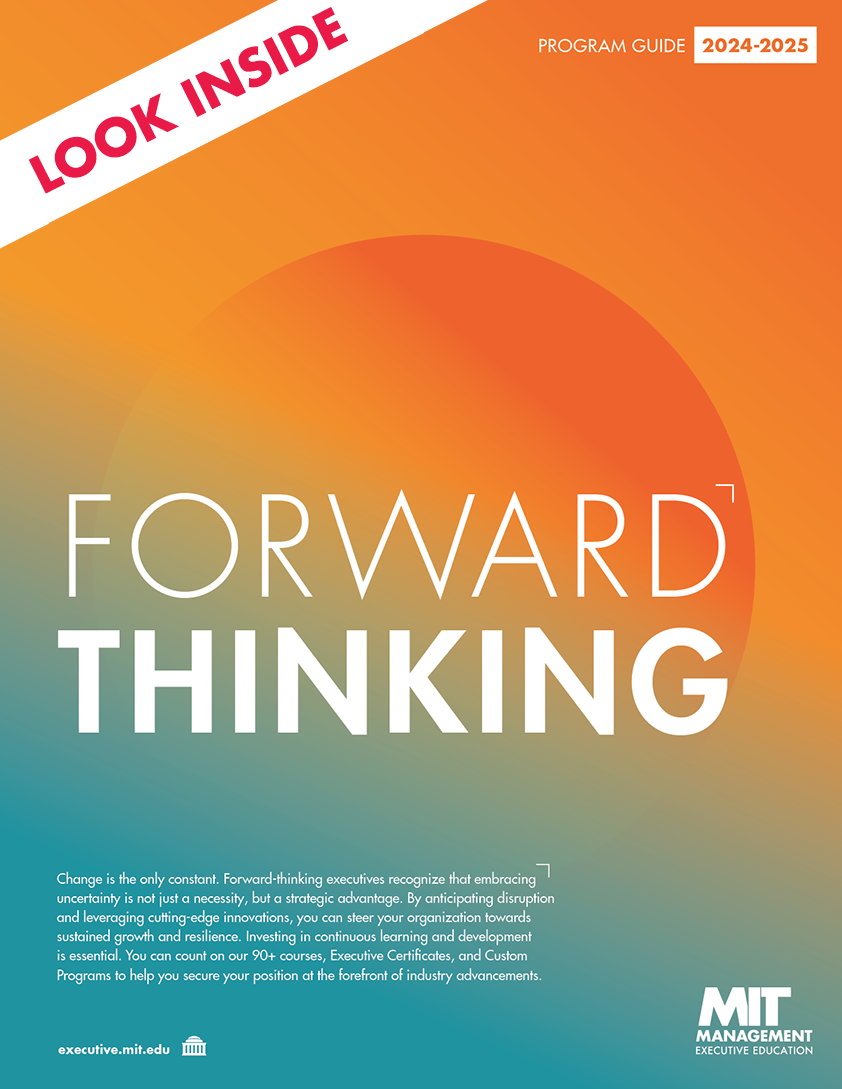Each year, we ask MIT Sloan Executive Education faculty to weigh in on trends they’re seeing in their fields and provide recommendations for leading organizations in the new year. Here is what they have to say about 2022!
Ben Shields says it's time for (re)building bridges in our organizations
"In the year ahead, leaders will need to redouble their investments in bridge building across their organizations. The pandemic-induced move to remote work yielded advantages, but it also made it more challenging for some leaders to maintain and evolve their cultures, let alone foster the type of cross-disciplinary teamwork required to solve difficult problems through innovation. As workplaces continue to recover from the pandemic, leaders will need to proactively repair and, in some cases, build new bridges between disparate groups and divisions. For example, a bridge that is critical to invest in: the one connecting data scientists and decision makers. Do your data scientists understand your business strategy and how their work connects to the bigger picture? Do you understand the insights and limitations of their work? Are you asking them the right questions, and are you structuring the decision making process to ensure the insights from their work are considered alongside other inputs? This is just one example of a bridge. There are others. The bottom line: Over the last two years, the very infrastructure of how organizations were run was upended. Some organizations are better off, others are still finding their way. All will benefit from a renewed emphasis on the how people, teams, and work connect and flow back and forth to drive results." Shields teaches in Communication and Persuasion in the Digital Age and Interpersonal Communication.
Hal Gregersen encourages managers to help teams navigate change more effectively
"Organizations' digital transformations got a huge push forward in the past year—on the technology front, anyway. In terms of the human experience, managers still need to learn how to help teams navigate disruptions more effectively. It's a serious challenge on three levels at once: people need to take on new roles, acquire new capabilities, and direct emotional energy down productive paths. But two of these are almost always neglected: crafting new roles and managing dynamic emotions. Building a systematic framework for navigating change is a powerful way to keep all three elements in focus. To start the new year with greater clarity and confidence, carve out time to ask and be asked three practical, purposeful questions: How are roles shifting in our team? What new capabilities must we acquire? How can we build and sustain more positive emotional energy? Then, combine the power of human creativity with ongoing technical change to plot a more productive course into the future." Gregersen teaches in Leading Successful Transitions in a Digitally Driven World and Inquiry-Driven Leadership.
Dr. Keri Pearlson reminds us that keeping ourselves, our families, and our organizations cyber secure is paramount in 2022
"The past two years have seen unprecedented cybersecurity issues in all aspects of our business. The pandemic heightened fear, uncertainty, doubt and chaos as we all moved to remote work, then began to come back to our offices. Malicious actors thrive in this kind of environment, as we have seen with the increase in ransomware, phishing, and other breaches. Keeping ourselves, our families and our organizations secure is paramount in 2022—and that will take both technology and people solutions. We need to have a robust security strategy with roles for everyone in the organization, since one thing is for certain: our companies will experience attempted, if not successful, breaches. and that will require both technology and people solutions. “The pandemic heightened fear and chaos as we all moved between office and remote work. Malicious actors thrive in this kind of environment. We need to have a robust security strategy with roles for everyone in the organization.” Pearlson teaches in Cybersecurity Leadership for Non-Technical Executives.
Bob Pozen wants us to create a hybrid work plan that works for everyone
"In the hybrid workplace of the future, managers need to be much more proactive to support innovative and productive teams as well as to strike the right balance between office and remote venues. Start by asking the right questions — for example, what is the primary function of each team member? A team that spends many hours on brainstorming or collaborative tasks needs more time at the office. Who needs to work closely together to do jobs effectively? These people should spend the most time together. While there is no single right way to design a hybrid workplace, asking the right questions can help each team shape a hybrid plan that is effective for everyone." Pozen leads the course Maximizing Your Personal Productivity: How to Become an Efficient and Effective Executive.
Dr. Phil Budden encourages competitive advantage through corporate innovation
"Innovation from the last decade is seeing us through the pandemic challenge, whether it’s digital innovation (such as Zoom and Teams) or deep-tech innovation (such as the vaccines). As we adjust to the ‘new normal,’ corporations are revising their strategies, and determining what role innovation will play in achieving their competitive advantage. Corporations can often accelerate their internal innovation by strategic engagement with the external ‘innovation ecosystem’ around them, but this way to secure competitive advantage is either overlooked or poorly planned. Drawing on a decade’s teaching and research, our executive education courses provide a practical approach to innovation for corporate executives and leaders – who may not feel that they are the most entrepreneurial or tech-savvy people in their organization – so that they can strategically accelerate internal innovation, and engage their external ecosystem (wherever they are in the world) for the competitive advantage that will differentiate them in the coming decade." Budden teaches in Accelerating Corporate Innovation.








